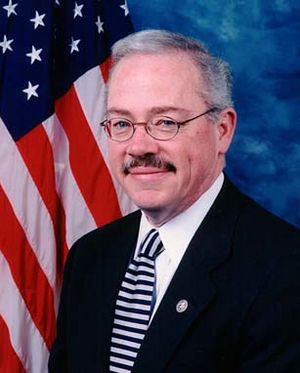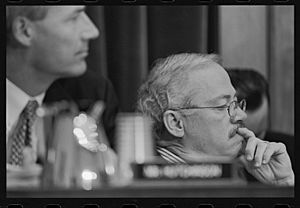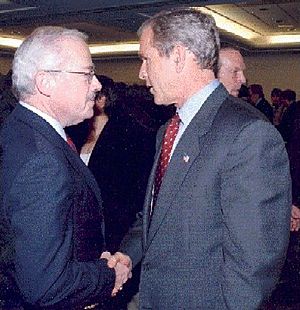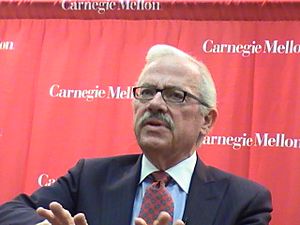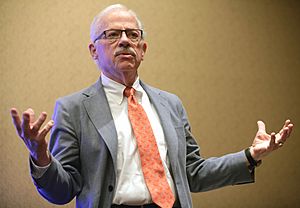Bob Barr facts for kids
Quick facts for kids
Bob Barr
|
|
|---|---|
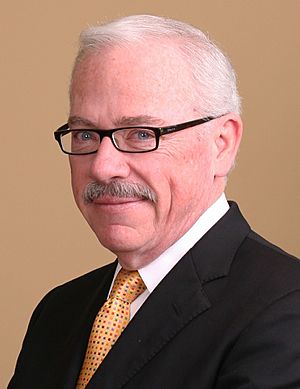 |
|
| Member of the U.S. House of Representatives from Georgia's 7th district |
|
| In office January 3, 1995 – January 3, 2003 |
|
| Preceded by | Buddy Darden |
| Succeeded by | John Linder |
| United States Attorney for the Northern District of Georgia | |
| In office 1986–1990 |
|
| Appointed by | Ronald Reagan |
| Preceded by | Larry Thompson |
| Succeeded by | Joe Whitley |
| Personal details | |
| Born |
Robert Laurence Barr Jr.
November 5, 1948 Iowa City, Iowa, U.S. |
| Political party | Republican (1970–2004, 2011–present) |
| Other political affiliations |
Democratic (until 1970) Independent (2004–2006) Libertarian (2006–2011) |
| Spouses |
Gail Barr
(m. 1976; div. 1986)Jeri Dobbin
(m. 1986) |
| Children | 4 |
| Education | University of Southern California (BA) George Washington University (MA) Georgetown University (JD) |
Robert Laurence Barr Jr. (born November 5, 1948) is an American attorney and politician. He served as a federal prosecutor and as a U.S. Representative. He represented Georgia's 7th congressional district as a Republican from 1995 to 2003. Barr attained national prominence as one of the leaders of the impeachment of President Bill Clinton. During his time in the House of Representatives, he authored the Defense of Marriage Act, which was later overturned by the Supreme Court in 2013 and repealed by the 117th Congress.
Barr joined the Libertarian Party in 2006 and served on its National Committee. He was the Libertarian Party's nominee for President of the United States in the 2008 election. Barr announced his return to the Republican party in December 2011. He lost a subsequent bid in 2014 for a Congressional seat.
Contents
Early life
Barr was born in Iowa City, Iowa, to Robert Laurence Barr and Beatrice Barr. His father, a career military officer who had graduated from West Point, was stationed in various locations around the world while pursuing his career in civil engineering.
The second of six children, Bob Jr. lived as a boy in Malaysia, Pakistan, Panama, Peru, Baghdad, and finally Tehran, Iran, where he graduated from Community High School in 1966.
He returned to the United States for college, attending the University of Southern California. There he joined the Tau Kappa Epsilon fraternity in 1967. He was elected to the position of Grand Prytanis on the fraternity's Grand Council, serving from 2013 to 2015.
During college, Barr's mother introduced him to the work of writer Ayn Rand. This fostered a newfound appreciation for conservatism and prompted Barr to join the Young Trojan Republican Club. He completed his B.A., cum laude, from the University of Southern California (USC) in 1970. He married his first wife while still in college. They divorced in 1976.
Early career
Barr continued in graduate school, earning a master's degree in International Affairs from George Washington University's Elliott School of International Affairs in 1972. He next earned his J.D. from Georgetown University Law Center (attending at night) in 1977. From 1971 to 1978, Barr worked for the Central Intelligence Agency (CIA) as an analyst of Latin American issues.
Barr married his second wife, Gail, in 1976. They have two children. Gail and Bob Barr divorced in 1986.
After leaving the CIA, Barr moved to northern Georgia. He practiced law and became active in the Republican Party, serving as county chair. Barr made an unsuccessful bid for the Georgia House of Representatives in 1984.
In 1986 Barr married his third wife, Jerilyn Dobbins, who was later known as Jeri Barr. Barr's website stated in 2008 that he and Jeri have four children and six grandchildren.
In 1986, Barr was appointed by President Ronald Reagan to serve as U.S. Attorney for the Northern District of Georgia – a post Barr held until 1990. His office prosecuted state and local officials, and got a perjury indictment on then-sitting Republican Congressman Pat Swindall, who ultimately served a year in prison on the charges. From 1990 to 1991, Barr was president of the Southeastern Legal Foundation., an Atlanta-based law firm and policy center that litigates in support of "limited government, individual economic freedom, and the free enterprise system".
Congressional career
Barr sought the Republican Party nomination for U.S. Senate in 1992, but lost the primary election to Paul Coverdell.
Barr was elected to the U.S. House of Representatives in 1994 as a Republican, upsetting six-term Democrat Buddy Darden, to represent Georgia's 7th congressional district in the 104th United States Congress. Barr was one of 73 Republican freshmen ushered into Congress in that election. The election became known as the "Republican Revolution" because it resulted in the first Republican House majority in 40 years – since the 1955 adjournment of the 83rd Congress.
After a Federal Election Commission audit of his 1994 and 1996 campaigns, Barr paid a $28,000 fine for illegal campaign payments.
Barr was later re-elected three times, serving from 1995 to 2003. While in Congress, Barr served as a senior member of the Judiciary Committee, as vice-chairman of the Government Reform Committee, and as a member of the Committee on Financial Services and the Committee on Veteran's Affairs.
In Congress, Barr became famous for his "dour" image and told constituents, "You don't send me to Washington to smile." He also said in a radio interview, "If it's not in the Constitution, I won't smile."
Georgia's congressional districts were reorganized by the Democratic-controlled Georgia legislature ahead of the 2002 elections for the 108th Congress. As part of the legislature's effort to get more Democrats elected from the state, Barr's district was renumbered as the 11th District and made significantly more Democratic. A large slice of his base was drawn into the same district as fellow Republican John Linder. The new district was numerically Barr's district – the 7th – but contained most of the territory from Linder's old 11th District. This move profited Democrats by leading to the inevitable defeat of an incumbent Republican (i.e., either Barr or Linder).
Barr's defeat was applauded by many Democrats and Libertarians. However, some individuals within these groups lamented Barr's defeat as a setback for privacy rights and libertarian causes in general.
Political positions in Congress
During his tenure, Barr was regarded as one of the most conservative members of Congress. However, Barr's criticism of the Bush administration's policies on privacy and other civil liberties after the 9/11 attacks was unusual among House Republicans (see Criticism of Bush Administration below). This criticism earned Barr other labels such as "Maverick", "Jekyll-and-Hyde", and "Libertarian".
Terrorism
He voted for the first USA PATRIOT Act, but only after his amendments adding "sunset clauses" were added to the final bill. Barr played a similar role during the debate over Bill Clinton's Comprehensive Anti-terrorism Act of 1995, crafting pro-civil liberties amendments to the original text. He now publicly regrets his Patriot Act vote.
War in Iraq
In 2002 Barr voted for the Iraq Resolution. He has since called for withdrawal of U.S. forces from Iraq, leaving no permanent military bases. A press release from Barr's presidential campaign stated: "The next president should commit to a speedy and complete withdrawal from Iraq, and tell the Iraqi people that the U.S. troops will be going home."
Religious freedom
In Congress, he also proposed that the Pentagon ban the practice of Wicca in the military.
Economic freedom
Barr advocates the repeal of the 16th Amendment, which gives the U.S. Congress the power to levy an income tax without apportionment. As an alternative, he proposes a form of consumption tax, such as the FairTax.
He also favors drastic reductions in government spending and the elimination of corporate welfare.
Criticism of Bush Administration
| “ | A man faithful to the Constitution doesn't stop criticizing presidents when the letter after their names change. | ” |
|
—Bob Barr, 2007 |
||
Since leaving Congress in 2003, Barr has become a vocal opponent of the Patriot Act and has stated that he voted for it reluctantly and regrets voting for it, only agreeing because the Bush administration promised not to attempt to expand the granted powers or use them for non-terrorism purposes, and the administration agreed to report to Congress on their usage. Barr says that the Bush administration promptly ignored these three promises given to Congress and has used the powers granted from the Patriot Act to further erode due process of law even in matters unrelated to terrorism. Barr claims that the Clinton administration did much of the same thing. In 2005 – the year the Patriot Act was due for renewal – Barr helped found an organization called Patriots to Restore Checks and Balances, a bipartisan group dedicated to eliminating aspects of the Patriot Act that could potentially affect law-abiding citizens rather than terrorists, and to "restore traditional checks and balances on government power so the country can effectively fight terror without sacrificing the rights of innocent Americans, rights that are guaranteed by the Constitution." Barr still serves as the group's chairman.
Barr has been a vocal opponent of President George W. Bush's claim of authorization to wiretap transnational phone calls without individual judicial license.
In 2006, he debated the architect of the Patriot Act, Viet Dinh, on terrorism and privacy issues.
Departure from Republican Party
In the 2004 presidential election, Barr left the Republican Party and publicly endorsed the Libertarian Party presidential nominee Michael Badnarik.
In 2006, he joined the Libertarian Party as a regional representative, then serving on the Libertarian National Committee.
Political associations
Barr sat on the board of directors of the National Rifle Association of America from 2001 to 2007.
Barr is a commentator on political and social issues and is chairman of the American Conservative Union Foundation's '21st Century Center for Privacy and Freedom'.
In January 2006, to emphasize the bipartisan nature of the event, Barr planned on introducing Al Gore at a speech co-sponsored by the Liberty Coalition and the American Constitution Society for Law and Policy to address what they called the "NSA Spying Scandal", in which Gore compared warrantless wiretapping to the FBI's illegal COINTELPRO project surveilling, discrediting and disrupting Martin Luther King Jr.
Libertarian Party
On December 12, 2006, Barr became a regional representative on the Libertarian National Committee, representing the Party's Southeast Region. Barr said: "I'm happy to announce that I am now a proud, card-carrying Libertarian who is committed to helping elect leaders who will strive for smaller government, lower taxes and abundant individual freedom."
American Freedom Agenda
Barr is one of the four founders of the American Freedom Agenda, which is described as "a coalition established to restore checks and balances and civil liberties protections under assault by the executive branch." The American Freedom Agenda has established a 10-point Freedom Pledge for presidential candidates to confirm their commitment to civil liberties. He is also a member of the Constitution Project's bipartisan Liberty and Security Committee.
Liberty Guard
Barr is chairman of the board of directors of Liberty Guard, an IRS 501(c)4 organization, which states its mission is to protect and defend individual liberty.
National Popular Vote
Barr is a supporter of the National Popular Vote Interstate Compact.
Other activities
In early 2008, Barr became an adjunct professor at Kennesaw State University and was scheduled to teach a course on privacy rights titled "Privacy and Public Policy in 21st Century Business and Society."
Barr appeared in the mock documentary Borat: Cultural Learnings of America for Make Benefit Glorious Nation of Kazakhstan. In his scene, he met with "Borat Sagdiyev" (portrayed by Sacha Baron Cohen) in the United States Capitol. Borat gave him cheese described as being made from Borat's wife's breast milk.
Barr endorsed the Free State Project on July 22, 2008, saying, "I think it's tremendous!"
Barr is listed as the President of the Law Enforcement Education Organization, a non-profit organization with a mission of serving "active-duty and retired law enforcement officers, by educating and assisting law enforcement personnel and agencies meet challenges posed by certain laws and regulations."
Advising former Haitian dictator Jean-Claude Duvalier
In 2011, Barr traveled to Haiti to lobby on behalf of "former Haitian dictator Jean-Claude "Baby Doc" Duvalier." According to Barr, "he is not serving as Duvalier's attorney, but is in Port-au-Prince to consult, assist and be Duvalier's voice to the international community."
2008 presidential campaign
In early 2008, rumors circulated that Barr was considering a presidential run under the Libertarian Party banner. Activists began a Facebook group dedicated to drafting Barr into the nomination contest, and Barr later confirmed his interest. He launched a presidential exploratory committee and campaign website on April 5, and formally announced his candidacy for the Libertarian nomination on May 12. His announcement came a mere ten days before the start of the Libertarian Party Convention, where delegates select the presidential candidate.
Following his announcement, Rasmussen Reports had Barr polling at 6% nationwide against Barack Obama (42%), John McCain (38%), and Ralph Nader (4%). The study identified Barr as the Libertarian candidate, but most voters said they did not know enough about him to have an opinion of him personally. Barr's support in the poll was a net drain on Republicans; he picked up 7% of the Republican vote, 5% of the Democratic vote, and 5% of the unaffiliated vote.
On May 25, 2008, Barr became the 2008 Libertarian presidential nominee after six rounds of voting at the 2008 Libertarian convention. He beat Mary Ruwart in the final round of voting, with 324 delegates to Ruwart's 276, with 26 none-of-the-above votes. Barr had received the endorsement of Wayne Allyn Root, one of his rivals for the nomination, after Root was eliminated following the fifth round of balloting. Barr, in turn, endorsed Root for the party's vice presidential nomination, which he received. Reason magazine senior editor Radley Balko called Barr "the first serious candidate the LP has run since I've been eligible to vote."
On June 4, 2008, Barr invited the Republican Party's presumptive presidential nominee, John McCain, and the Democratic Party's presumptive presidential nominee, Barack Obama, to weekly presidential debates through an official press release.
Many opinion leaders predicted that Barr could siphon off conservative votes that would have otherwise gone to McCain. John Linder, who defeated Barr for the Republican nomination in a 2002 congressional race, said that Barr could cause serious problems for McCain in some states. Barr repeatedly rejected this assertion as scapegoating, responding that small-government Republicans would not vote for McCain anyway, nor would civil liberties advocates vote for Obama.
Barr appeared on the ballot in 45 states. In July, he filed a lawsuit against Oklahoma for its unusually restrictive ballot access laws, which he contends are contrary to the First Amendment right to petition one's government for a redress of grievances. In July, a Zogby poll had Barr receiving 6% of the vote nationwide, as well as double digits in several states.
A Zogby poll released on August 15, 2008, indicated that most Republican and Democratic voters wanted Barr to be included in the presidential debates. The poll also indicated that almost 70% of independent voters would have liked to see him included.
On September 17, 2008, Barr filed suit in Texas to remove both McCain and Obama from the ballot. Both political parties failed to file their nominees by the deadline. On September 23, 2008, the Texas Supreme Court rejected the request without giving a reason for its decision.
Among his campaign positions, Barr distinguished himself strongly from Obama and McCain by opposing the financial bailout bill.
On November 4, 2008, Barr received 523,686 votes, 0.4% of the national vote.
Return to Republican Party
Following his statement that he would not challenge the Republican incumbent in the 2012 primary race for Georgia's 14th congressional district, he subsequently indicated his return to the Republican Party and support for 2012 GOP congressional candidates when stating – "Our country is at a serious cross-roads, without question we need new leadership in the White House, and a part of that turnaround in 2012 will be solid GOP majorities in both chambers of Congress."
Aborted 2012 congressional campaign
Barr had expressed interest in running for Congress again as a Republican in 2012, challenging incumbent Republican Tom Graves in Georgia's 14th district. The newly created district included Floyd and Paulding counties, which were part of the territory Barr represented in his first congressional stint. Between them, they made up 38 percent of the 14th's population. Barr has lived in Smyrna, in Cobb County, for many years, but told several friends he planned to move to Paulding County in order to challenge Graves. Despite strong polling numbers, Barr chose to abandon his plans for running, citing concern on the potential impact it would have on his law firm and family.
2014 congressional campaign
Barr held a news conference on March 28, 2013, at Adventure Outdoors in Smyrna, Georgia where he announced his upcoming run for his old congressional seat, the 11th. The seat had come open after his successor, Phil Gingrey, gave it up to run for Senate. Barr was vying to become the first Georgia Republican to return to the U.S. House after a gap in service. Barr placed second in his six-way House primary with 26% of the vote. State Senator Barry Loudermilk, who was backed by the Senate Conservatives Fund, placed first in the primary with 37%. Since no candidate won at least 50% (plus 1) of the vote, a runoff took place on July 22, 2014. Barr lost the runoff to Loudermilk by a nearly 2:1 margin.
See also
 In Spanish: Bob Barr para niños
In Spanish: Bob Barr para niños


